N e w s B r i e f s
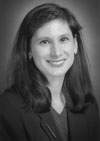
Elizabeth Capezuti is a noted research scholar in gerontological nursing.
The Ties That Bind
Faculty appointment boosts gerontology research
At last count, the number of senior citizens in the United States was 70 million and growing. A joint appointment by the School of Nursing and Emory's Wesley Woods Center addresses the needs of this population through nursing research.
Elizabeth Capezuti, PhD, RN, FAAN, joins Emory this fall as the Independence Foundation-Wesley Woods Chair in Clinical Gerontological Nursing Scholarship. She comes to Emory from the University of Pennsylvania School of Nursing, where she was a scholar and research assistant professor in geriatrics and gerontology. Her appointment is supported by a previous endowment to nursing from the Independence Foundation in Philadelphia and by funding from Wesley Woods.
"Dr. Capezuti's appointment is an important indicator of where we want the nursing school to be," says Dean Marla Salmon. "We are committed to improving clinical practice through research, and she is a superb example of the nurse scholar of the future. She has had a profound impact on the care of older people."
While at Penn, Capezuti received international recognition for her research. Her early work focused on the clinical challenges of protecting frail elders from bed rail injuries and led to a series of funded studies that ultimately changed national practice standards, the legal interpretation of liability, and funding requirements to improve patient services.
In bringing her expertise to Emory, Capezuti broadens the clinical and research experience for students and faculty. She will be instrumental in strengthening the Gerontological Advanced Practice Nurse Program at Emory and developing interdisciplinary education programs at Wesley Woods.
Capezuti began her career 20 years ago in nursing homes and hospitals in New York City before joining Penn, where she earned a number of teaching and research honors, including the Otsuka/American Geriatrics Society Outstanding Scientific Achievement for Clinical Investigation Award for 2000.
After settling in at Emory, Capezuti will serve as associate director of nursing sciences for Wesley Woods' new Center for Health in Aging. The new center will promote interdisciplinary research, professional and public education, and programs to improve the quality of life and care for the geriatric population.
"There's always been a lot of mutual interest and discussion between the School of Nursing and Wesley Woods, and we've made a lot of progress in strengthening that relationship during the past year," says Joseph Ouslander, MD, Wesley Woods vice president of professional services and the proposed director of the Center for Health in Aging. "Dr. Capezuti's recruitment represents a major building block in interdisciplinary research. The nursing school deserves a lot of credit for expanding its focus in gerontology and its relationship with Wesley Woods."
That's great news for Emory's nursing students and faculty. "Our future depends on the creation and maintenance of strong partnerships across disciplines and settings," Salmon says. "The Independence Foundation-Wesley Woods Chair came about because of our shared commitment to enhancing research, education, and service."
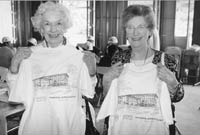
Several alumni were on hand for the topping-out celebration, also known as Worker Appreciation Day. Christie Hauck, 38N, (left) and Edith Honeycutt, 39N, proudly display their commemorative T-shirts.
Sweat Equity for the Future
Holder Construction gift honors 1520 Building crew
It was T-minus eight months and counting when faculty, staff, and alumni celebrated the May topping out of the new School of Nursing building at 1520 Clifton Road. To mark the occasion, guests toured the structure and mingled with workers on the third floor as the builder handed out commemorative T-shirts. While everyone present was eager to reach the January 2001 move-in date, the day definitely belonged to the dedicated crew of Holder Construction Company.
With 150 guests present, the project's general contractor announced a gift to the School of Nursing to honor company workers and subcontractors.
"We build a lot of buildings, but rarely do we have the opportunity to forge the kind of relationship that we have with the folks who are doing this job so well," said Tommy Holder, company chairman and CEO. "Holder Construction has decided to honor you in a way that we've never done before, with a gift to the nursing school. In return, Emory will name a classroom for all of you."
Dean Marla Salmon could be considered the building's honorary project manager. After all, she keeps an eye on the $22 million building's progress every day as she drives to campus.
"What you are doing here will touch our lives for a long, long time," Salmon told the workers. "In the future, if you meet an Emory nurse who has graduated in this century, just remember that it was your work that helped them get where they wanted to be."
Room with a view
To view construction of the School of Nursing's new home, go to www.nursing.emory.edu and click on the words "current progress" next to the "hard hat" icon. While there, take a moment to browse through the school's redesigned website, complete with news about the school and the profession.
"It's
a wonderful time
to be a nurse.
Your degree
is a building block
to many things
and serving the public
in many ways."
—Commencement speaker Dr. Linda Aiken
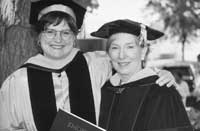
Dean Marla Salmon and honorary degree recipient Dr. Linda Aiken were friends and colleagues at Penn.
Nursing in the Public Interest
Aiken urges graduates to make a difference
During the processional for this year's School of Nursing commencement ceremony, one of the graduates stepped out of line momentarily to right a toddler who had stumbled on the walkway. That one small act symbolized the essence of the nursing profession—what Dean Marla Salmon described as a journey "filled with love, joy, and satisfaction in knowing you have made a difference in the people you serve."
It was the first Emory graduation for Salmon, who left the University of Pennsylvania last year to lead future nurses at Emory. On that day, Salmon welcomed Penn colleague Linda Aiken, PhD, RN, FAAN, who received an honorary degree from Emory before addressing nursing graduates.
"It's a wonderful time to be a nurse," said Aiken, former vice president of the Robert Wood Johnson Foundation and the first person at Penn to hold the Claire M. Fagin Leadership Chair in Nursing. "Your degree is a building block to many things and serving the public in many ways."
She counseled graduates on entering a tumultuous field where rapid medical advances and managed care pressures are the norm. "You face challenges as great as Florence Nightingale did when more patients died of problems encountered in hospitals than on the battlefield," she said.
Even in the best of times, health care is not ideal, given the sixfold differential in morbidity and mortality rates among hospitals today. "The number of nurses is one of the single most important factors in mortality and patient outcomes," Aiken stressed. "It is up to nurses to communicate problems and help solve them."
To illustrate the possibilities, Aiken cited nursing's impressive record of improving survival rates for babies and mothers, introducing intensive care and home health care delivery, advocating that hospice care be covered by Medicare and other forms of insurance, and pushing for better care of AIDS patients. "Nurses have significantly shaped the kinds of care now available to the public because of their commitment to serving the public," she noted.
With those examples in mind, Aiken urged the Class of 2000 to always remember the bottom line of nursing—providing excellent and humane care. "Go forth and start making your influence felt. We are depending on you to make our health care system better."
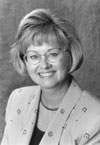
Dr.
Sandra Dunbar joined the Emory nursing
faculty in 1988.
In Praise of Teaching and Scholarship
Dunbar is first Candler nursing professor
Sandra Dunbar, DSN, RN, FAAN, begins the 2000 academic year as the school's first Charles Howard Candler Professor of Cardiovascular Nursing. She joins a stellar list of senior university faculty appointed to this professorship in recognition of distinguished teaching and scholarship. The professorship is named for the late Board of Trustees leader and son of Asa G. Candler, founder of Emory's Atlanta campus.
Dunbar currently is the interim coordinator of the nursing school's new doctoral program and for six years served as coordinator of the Graduate Critical Care Nursing Program. She has earned national and international recognition for her clinical research involving patients who have experienced sudden cardiac arrest or who have been diagnosed with an irregular heart rhythm.
Specifically, Dunbar has focused on helping patients and families adapt to cardiovascular disease through treatment with technology and critical care. She is the principal investigator for a $1.3 million study funded by the National Institute of Nursing Research to reduce emotional distress in high-risk arrhythmia patients who are treated with an implantable defibrillator. In another study, she is working with co-investigators in nursing and medicine to test a family-focused intervention to improve outcomes in heart failure patients. The three-year study is funded by a grant-in-aid from the American Heart Association (AHA).
Just last year, the AHA Council on Cardiovascular Nursing honored Dunbar with its Katharine A. Lembright Award for her contributions to and achievements in cardiovascular nursing research. In addition to being an AHA Council fellow, Dunbar is a fellow of the American Academy of Nursing and is listed in Who's Who in American Nursing. She holds an Outstanding Alumni Award from Florida State and actively serves in professional organizations and on numerous nursing school and university committees.
Next to Dunbar, no one is more pleased about her new appointment than Dean Marla Salmon. "We are extremely proud that Dr. Dunbar has become the school's first Candler professor," says Salmon. "Her appointment signals wonderful recognition for her accomplishments and the arrival of the school as a major leader in nursing scholarship. She is an ideal 'inaugural' Candler professor and an excellent role model for young scholars."
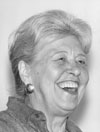
Dr.
Eleanor K. Herrmann worked at a missionary hospital
in Guatemala.
The Tapestry of Nursing
Herrmann delivers Hugh P. Davis Lecture
We are each weaving a tapestry every day out of the threads of our lives," said Eleanor K. Herrmann, EdD, RN, FAAN, University of Connecticut professor emerita, as the School of Nursing's annual Hugh P. Davis lecturer in May. Drawing from her experiences as a nurse at a missionary hospital in the highlands of Guatemala, Herrmann observed, "The people there had as much of an impact on my view of nursing as a profession as my work there influenced the practices of Mayan nurses."
Her lecture provided a cross-cultural comparison between the art of traditional Mayan weavers and the art of professional nurses in Western medicine—what Herrmann called "The Tapestry of Nursing." Her overarching theme: both professions rely on traditional values and tools in a high-tech world.
Nursing as a profession is a relatively recent invention, explained Herrmann. But nursing as ministering to the basic needs of human life has continued since the dawn of time. Similarly, on return trips to Guatemala, she found that although Mayan tapestries tell more and more contemporary stories, the weavers still use the same style of hip loom and rods as in pre-Columbian times—a proven testament to their value.
Herrmann argued that the fundamental "tools" of nursing, such as compassion, ethics, and professionalism, should be held in as great esteem by nurses—especially in today's changing health care environment. Only then will the nursing profession garner the same level of respect among western health care professionals as the art of weaving has in Mayan communities today.
"Our
advanced practice program and our research will be stronger
because of the resources
we have at Emory
through Wesley Woods."
—Dr. Christi Deaton, postdoctoral fellow

Dr. Cornelia Beck (center), senior visiting nurse scientist from the University of Arkansas, consults with Drs. Patricia Clark (left) and Christi Deaton at Wesley Woods Center.
In the Name of Science
Woodruff grant enhances gerontology expertise
Two faculty members have hung up their teaching hats for a year to focus on their development as nursing scientists. Assistant Professors Patricia Clark, PhD, RN, and Christi Deaton, PhD, RN, are broadening their expertise as postdoctoral fellows in gerontology at Emory's Wesley Woods Center. When their one-year fellowships end in late fall, they will share their knowledge with students enrolled in the Gerontological Advanced Practice Nurse Program.
The fellowships are one benefit of a grant from the Woodruff Foundation to strengthen interdisciplinary research in nursing gerontology. In Deaton's case, the fellowship has provided valuable time to concentrate on her interest in older patients with heart disease, with a special focus on elderly women recovering from cardiac surgery and those with atrial fibrillation. Additionally, her experience will contribute to gerontological nursing education when she returns to the classroom.
"We need more advanced practice nurses with specialized knowledge to meet the health care needs of elderly patients," says Deaton. "Our advanced practice program and our research will be stronger because of the resources we have at Emory through Wesley Woods."
Clark agrees. "The gerontology program will enable advanced students to care for older adults in a variety of settings, including the community, long-term care, and hospitals."
Like Deaton, Clark has learned more about her field and the research process. Mentors at the School of Nursing and Wesley Woods have steered her toward research funding sources, provided feedback on manuscripts and grant proposals, and helped refine her research goals to move her study forward to help family caregivers of older adults with chronic illness.
"One of the most important aspects of caring for older adults and their families is to help older adults manage their illnesses so they can avoid hospitalization and enjoy a normal life," Clark explains. "If we can help them reduce health care utilization, we can also reduce their health care costs."
Additionally, the Woodruff Foundation grant provides for two awards for interdisciplinary research in gerontology. It has also supported visits by senior scientists from top nursing schools to lecture and consult with faculty in nursing and medicine. More visits are planned this year to provide powerful role models of what senior nurse scientists can achieve in gerontology.
Nursing and Midwifery
Salmon addresses WHO conference
Dean Marla Salmon was right at home when she delivered a paper in Munich on the role of nurses and midwives in public health. The School of Nursing dean focused on public health and national health insurance as a Fulbright Scholar at the University of Cologne nearly 30 years ago. She also learned to speak fluent German, which served her well during the high-level deliberations at the Second WHO Ministerial Conference on Nursing and Midwifery in Europe.
During the June gathering, Salmon challenged participants to think about the future of nursing and midwifery in Europe, where the average life expectancy has declined for the first time since World War II. By rallying as a political and social force, nurses and midwives can shape and improve public health for families, communities, and nations.
"Taking on new functions will mean that many nurses and midwives will have to disengage from familiar ways of working," said Salmon, who chairs the World Health Organization's Global Advisory Group on Nursing and Midwifery. "Their colleagues will need to support their movement forward. This will require abandoning stereotypes of what nurses and midwives do and who they are."
To engage in public health, nurses and midwives must expand their network of colleagues and move beyond the clinical to the social context. "We will know that necessary change has taken place when we see these key workers engaged at all levels of the health campaign, including serving as health managers and planners, policy-makers, and even ministers of health," Salmon explained.
By moving into such roles, nurses and midwives can promote new knowledge, new models, new partnerships, and new policies to move public health forward. Each step requires a commitment of mind and heart.
"Real change requires courage—moving from what is known and comfortable to the uncertainty of creating new futures," Salmon said. "This is not work for the weak-willed or the faint of heart. It's what all Europeans deserve from their health leaders."
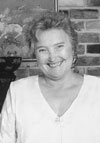
Dr. Em Bevis
Tribute: Emory Medal winner Em Bevis dies
A Beloved Educator and Friend
The School of Nursing lost a dear friend with the unexpected death of Em Olivia Bevis, EdD, 55N, FAAN, on July 20, 2000. In a career spanning more than 40 years, Bevis made a lasting contribution to nursing care and education in Georgia and the nation.
As a faculty member with the Medical College of Georgia in the 1970s, Bevis established a satellite graduate nursing program in Savannah, enriching health care in an area that historically was underserved. She left the college in 1979 to found and direct a new baccalaureate nursing program at Georgia Southern, with an emphasis on preparing nurses for practice in rural areas. Within six years, the program received national recognition for its innovation and effectiveness.
A respected author and consultant, Bevis wrote two highly successful books on nursing curricula, one of which was translated into Japanese. Her 1989 book, Toward a Caring Curriculum: A New Pedagogy for Nursing, co-written with Jean Watson, was considered a best seller by the National League for Nursing and brought consultation requests from all over the world. The American Journal of Nursing named it Book of the Year in 1990.
Despite the many demands on her time, Bevis never missed an opportunity to share her insight and humor with nursing students and faculty at Emory. She coordinated teaching workshops for faculty and delivered one of the school's annual Hugh P. Davis lectures. Her service to Emory and the nursing profession prompted former Interim Dean Mary Woody to nominate Bevis for the Emory Medal, awarded to her in 1995.
"Em was just an outstanding alumna," recalls Woody. "Her commitment to nursing education and service set a wonderful example for students to follow. There's no doubt she will be missed at Emory and in the national nursing community."
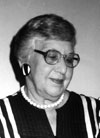
Nan Egan
Tribute: Egan founded MN program in public health
An Emory Pioneer
Nan Springstead Egan, MN, RN, professor of nursing emerita, died on December 16, 1999, after a long illness. Faculty, staff, and students remember her as an unflappable force in the School of Nursing for more than 25 years.
One of Egan's proudest achievements was developing Emory's master's program in public health nursing in 1960. She also was a lifetime member of the American Public Health Association. "Nan was a public health nurse through and through," says Helen O'Shea, PhD, RN, professor of nursing and BSN program coordinator.
With wisdom that comes only from experience, Egan built and maintained the nursing school's tradition of excellence as director of the undergraduate program. Always abreast of the most sophisticated and innovative curriculum advances, she conveyed progress to both students and faculty. Egan also led the nursing school as interim dean following Ada Fort's retirement in the mid-1970s.
Her expertise was augmented by many years as an accrediting visitor with the National League for Nursing. "Because of her work as an accreditor, Nan was well aware of the expectations and standards that the School of Nursing had to meet. She ensured that our graduates were well prepared for practice," says O'Shea.
Egan is survived by her stepson, Jon J. Egan, of Snellville, Georgia, and the legions of nurses she helped train during her tenure at Emory in the 1960s and 1970s.
